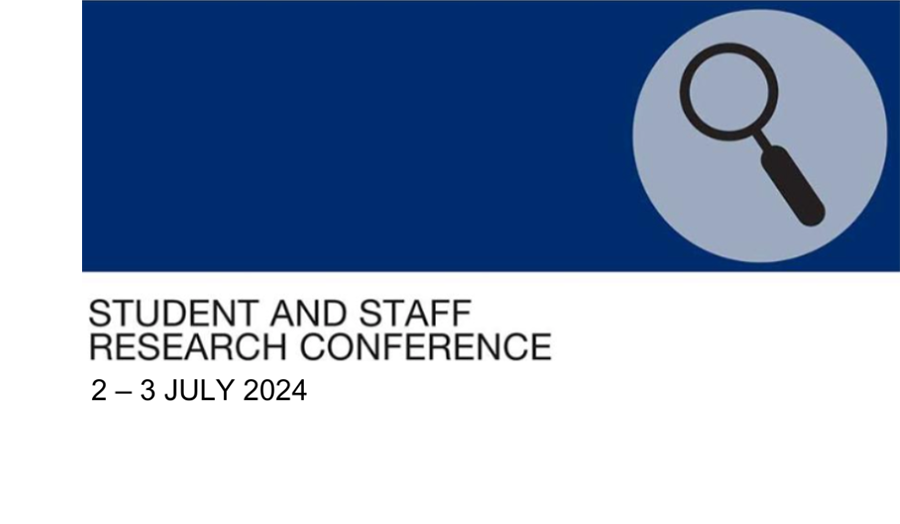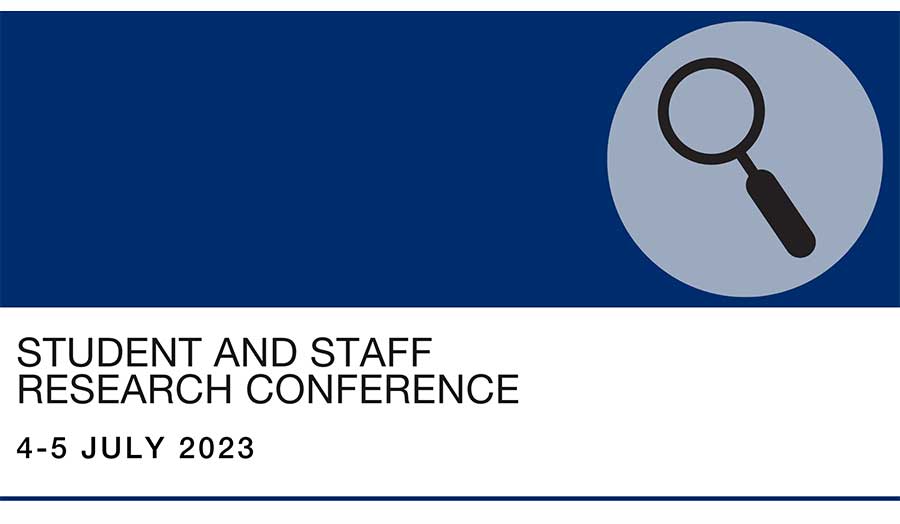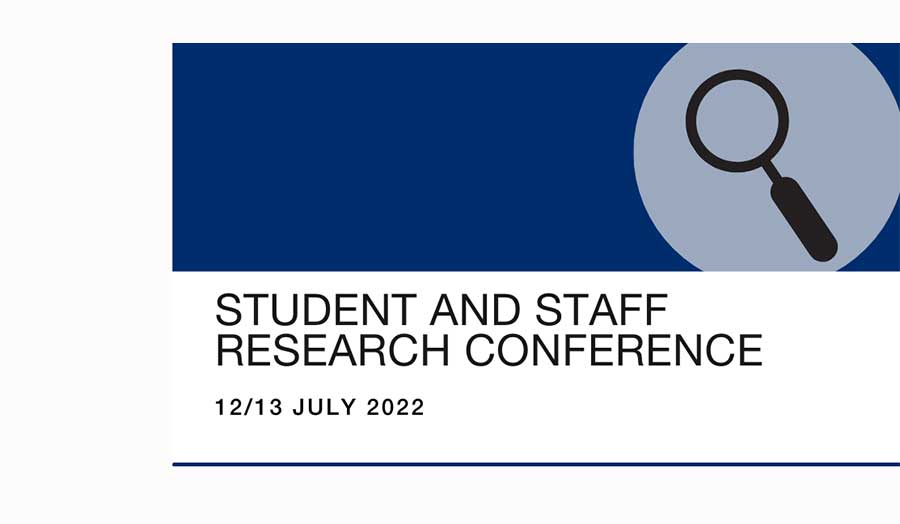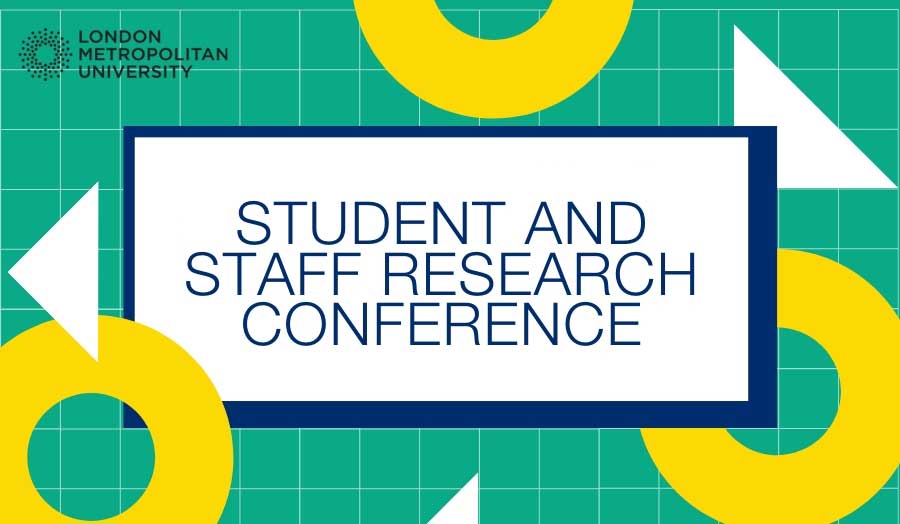Our very successful fifth Student and Staff Research Conference Past – Present – Future: Research at London Met took place from 2 to 3 July 2024. It highlighted our key concerns of equity, social justice, health, biological and digital security, intercultural competence, sustainability and liveable cities. The conference featured 53 presentations including three keynotes, 20-minute talks, 3-minute lightning presentations and recorded presentations that could be accessed asynchronously.
The conference was organized by the Postgraduate Research Student-Staff Liaison Forum with support from the Graduate School and the Research and Postgraduate Office. It was opened by Maeva Khachfe, Director of Research, KE and Enterprise Operations, who gave an overview of the very positive development of our research culture over the past years and the future pathways for building on our successes.
Day One
The opening keynote lecture by Sarah Keating, Education Department of the Council of Europe, addressed the rise of populism in Europe and what citizenship and values education can do to counter it. Her presentation was very well received and led to 30 minutes of lively discussion in which her worrying data on young people’s views featured greatly. The talks by Alistair Ross on researching young people’s understanding of citizenship and Torfeh Rahmanzadeh’s on ESOL teachers’ perceptions on language, culture and citizenship broadly continued the topic of the keynote, followed by Alessia Dalceggio reporting on how Syrians and Afghans experience their resettlement in London.
The afternoon started with a lecture by Preet Kainth on diabetes in South Asians and how issues of existing research, culture and language conspire to prevent equitable access to health care. This was followed by Janet Douglas Gardner’s talk on community cultural wealth of students in a post-1992 university. Then Stephanie Helland presented Norway’s approach to public sector innovation.
It is a feature of our student and staff research conferences that we make recordings available of talks that could not be given live. The participants have the opportunity to ask questions, and both Bettina Coleman-Schoels’ talk on the effects of organisational change in a ‘born-global family firm’ and Olivia Ibbotson’s talk on the legality of military white phosphorus uses led to lively discussions.
The day continued with several strong and provocative presentations on drama workshops to reduce adolescent anxiety (Laura Somerville), facial feedback and mood congruent stimuli (Japed Tarapdar), institutional ethnography in relation to teaching excellence in higher education (Charl Fregona) and using drawing to support research and researcher development (Hazel Messenger). It was concluded with a topical keynote lecture by Lan Jiang celebrating decades of corporate social responsibility and governance research at London Met which reunited former students and colleagues and featured contributions by important researchers such as David Crowther and Sam Idowu in the discussion. The keynote was followed by Eirini Meimaridou’s brief but impassioned summary of the first day proceedings.
Day Two
While the first day concentrated on social science, education and business research, the second day featured arts, architecture, computing and the sciences. It started with the insightful, excellently illustrated keynote by alumna Lucy Bullivant on urbanist strategies to support sustainability, meaning and belonging, which triggered a lively discussion. The theme of liveable spaces was continued by James Payne’s territorial typologies, exploring the topographies of several cities, and Hosn Houssami’s imaginary work with children in Beirut, Lebanon. The morning was rounded off with a very well-argued talk by Adeyemi Akande on the missing limbs of the Seated Figure of Tada.
The afternoon started with a thought-provoking talk on variability in vitamin D prescription patterns by Sunila Maharjan and Subeksha Shrestha, followed by Luke Lucas presenting puzzling data on synaesthesia, leading to a lively discussion. External guest speaker Joseph Legate, Director of Product and Marketing at Mobilise, reported on the difficult but worthwhile journey of establishing a Knowledge Transfer Partnership with us and making knowledge exchange work. Dipo Dunsin reported on clever AI-based reengineering in malware detection.
In the ‘Protecting Individuals and Society’ panel, Mia Outteridge made science look easy in talking us step-by-step through the development of new antiviral agents, while Iris Magne and Olivia Ibbotson promoted the International Biological Security Education Network. Nirmala Lee talked about how the consumers of financial products could be protected better (but probably won’t be). The final paper by Chelsea Mainwaring addressed the topical issue of image-based sexual abuse exploring the reactions and experiences of bystanders.
Both days featured 3-minute lightning presentations just before lunch, followed by questions to the presenters and the opportunity for more in-depth dialogue during the poster exhibition over lunchtime. The presentations addressed a wealth of issues including inner monologue and cognitive performances, racial trauma, dyslexia and race, child sexual abuse in minoritised communities, participatory practices in museums, digitalisation and places of public protest, Liming as a research methodology, and the evolution of international arms control on the first day. The second day brought talks on the title of architect, a provocative presentation on positive effects of climate change on gender equality, mass personalisation in the fashion industry, new therapeutic agents for Alzheimer’s disease, shocking data of campylobacter in red meats, the effects of vitamin D intake on telomere length, and a talk on digital forensic readiness.
Prizes
The conference featured several prizes which were awarded via audience voting. The lucky presenters are:
- Best Poster: Winner - Oliva Ibbotson, The Evolution of International Arms Control from the 1800s to 2010
Runner up - Ntuthuko Khanyile and Ravi Mooruth, Telomere Length (TL) and Vitamin D - Best Recorded Presentation: Winner - Oliva Ibbotson, An investigation into the legality of White phosphorus uses in the military and the consequences to human health and the environment
Runner up - Skye William Eade, The Dyslexic Sublime: Exploring the Art-Making Process of Dyslexic Artists through the Lens of the Sublime - Best 20-minute presentation: Winner - Dr Subeksha Shrestha and Sunila Maharjan, Health - Vitamin D prescription patterns
Runner up - Mia Outteridge, The Design and Development of Antiviral Agents that Target Human Coronaviruses - Best Lightning Talk Day 1: Winner - Olaide Philips, The Possibilities of Belonging: Investigating the Relationship between Racial Trauma and Well-being in Higher Education Institutions
Runner up - Olivia Ibbotson, The Evolution of International Arms Control from the 1800s to 2010 - Best Lightning Talk Day 2: Winner - Ravi Mooruth, Telomere Length (TL) and Vitamin D
Runner up - Sangeetha Ganesh, Prevalence of Campylobacter in red meats: A cross-contamination study
As a special feature and in keeping with our conference topic ‘Past – Present – Future’, we had invited four alumni to share their journeys since graduation and answer questions. Subeksha Shrestha, Cliona Brennan, Adebowale Oriku and Christine Jefferys gave very different accounts but all four agreed that achieving a doctorate opened doors and changed how they were perceived and how they perceived themselves.
Ken White delivered a gracious closing address remarking on the high standard of contributions and thanking the presenters, audience, organisers and technicians behind the scene. This was arguably our most successful Student and Staff Research Conference to date!
By Klaus Fischer and Eirini Meimaridou

The conference took place in-person at our Holloway campus across 2 and 3 July 2024.





